
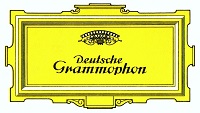 Decca and Deutsche Grammophon: Recent Releases Early 2021 and
Some Back
Catalogue
Decca and Deutsche Grammophon: Recent Releases Early 2021 and
Some Back
Catalogue
By Brian Wilson
In my
survey
of recent recordings from Chandos and Hyperion, I mentioned that the
independent labels were generally more innovative than the majors. I partly
had to retract that generalisation even in the survey: the new Decca
Josquin recording from Stile Antico is a very worthy successor to the
Gimell series of that composer’s Masses, completed in late 2020. I
mentioned that I might even be considering it for one of my Recordings of
the Year. It takes pride of place in this survey.
With the flow of new recordings somewhat diminished by the pandemic, I’ve
included some back catalogue items from these labels, available to download
or stream and, in some cases, as a special CDR from Presto, whose list of
such special releases is well worth checking out. In fact, at MusicWeb
International, we are aiming to concentrate in the near future, in addition
to new releases, on earlier material that we may not have covered, much of
it now available only to special order or as a download. You may already have
noticed some names of new reviewers who have joined us principally with
reviews of downloads, including back catalogue, in mind.
Index
:
BRITTEN
– The Young Person’s Guide; Four Sea Interludes; Matinéés and Soirées Musicales – LSO, Covent Garden O/Britten; National
SO/Bonynge (see also ROSSINI arr. RESPIGHI below).
BRITTEN
Prelude and Fugue; Simple Symphony (see English Music for Strings)
BRUCKNER
Symphonies Nos. 2 and 8 – Gewandhausorchester Leipzig/Andris Nelsons (with
WAGNER Meistersinger Overture)
 CHAUSSON
Poème; PROKOFIEV Violin Concerto No.1;
RAUTAVAARA Serenades – Hilary Hahn
CHAUSSON
Poème; PROKOFIEV Violin Concerto No.1;
RAUTAVAARA Serenades – Hilary Hahn
ELGAR
Serenade for Strings (see TCHAIKOVSKY)
 IVES
Symphonies Nos. 1-4 – Gustavo Dudamel
IVES
Symphonies Nos. 1-4 – Gustavo Dudamel
 LISZT
Piano Sonata in b minor, etc. – Benjamin Grosvenor
LISZT
Piano Sonata in b minor, etc. – Benjamin Grosvenor
MOZART
Eine kleine Nachtmusik
(see TCHAIKOVSKY)
MOZART
Die Zauberflöte
– Orchestre Philharmonique de Strasbourg/Alain Lombard
 Josquin Des PREZ
Missa Pange Lingua
and other works – Stile Antico
Josquin Des PREZ
Missa Pange Lingua
and other works – Stile Antico
PROKOFIEV
Violin Concerto No.1 (see Chausson)
RACHMANINOV
Symphony No.1; Symphonic Dances – Philadelphia O/Nézet-Séguin
RAUTAVAARA
Serenades (see Chausson)
RIMSKY-KORSAKOV
Scheherazade
– Concertgebouw/Riccardo Chailly (with STRAVINSKY Scherzo fantastique)
ROSSINI
arr. RESPIGHI La Boutique fantasque – Nation
SO/Bonynge (with BRITTEN Matinées, Soirées)
SAINT-SAËNS
Le Carnaval des Animaux, etc. – The Kanneh-Masons
SCHMIDT
Complete Symphonies – Paavo Järvi
SCHNITTKE
Works for violin and piano – Daniel Hope, Alexey Botvinov
STRAVINSKY
Scherzo fantastique
(see RIMSKY-Korsakov)
TCHAIKOVSKY
Serenade - Zürcher Kammerorchester/Daniel Hope (with ELGAR, MOZART
Serenades)
WAGNER
Meistersinger
Overture (see BRUCKNER)
English Music for Strings: PURCELL, ELGAR, BRITTEN, DELIUS, BRIDGE –
ECO/Benjamin Britten
I am Hera
- Hera Hyesang Park
Queen of Baroque -
Cecilia Bartoli
***

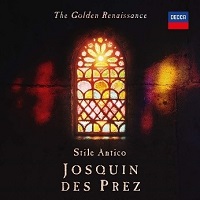 The Golden Renaissance
The Golden Renaissance
JOSQUIN Des PREZ (c.1450/55-1521)
Missa Pange Lingua
and other works
Salve Regina
a5 [7:34]
Pange, lingua, gloriosi
[0:51]
Missa Pange Lingua
: Kyrie [3:21]
Ave Maria, Virgo Serena
[5:56]
Missa Pange Lingua
: Gloria [5:10]
Inviolata, integra, et casta es
[7:32]
Missa Pange Lingua
: Credo [8:33]
Vivrai je tousjours
[3:09]
El Grillo
[1:41]
Missa Pange Lingua
: Sanctus – Benedictus [9:45]
Virgo salutiferi
[8:10]
Missa Pange Lingua
: Agnus Dei [8:34]
Hieronymus VINDERS (fl.1525-26)
O mors inevitabilis
[3:23]
Jacquet de MANTUA (1483-1559)
Dum vastos Adriæ fluctus
[9:19]
Stile Antico
rec. 24 July 2020, All Hallows, Gospel Oak, London.
Texts and translations included with CD and press preview – but no booklet
with download/streamed version.
Reviewed as streamed in 24/192 stereo and downloaded from press preview.
DECCA 4851340
[82:48] CD from
Amazon UK
or
Presto
Stile Antico’s first of what I hope will be many recordings for Decca is
hailed as the precursor of three CDs of Renaissance music. Having praised
many of their earlier recordings on the Harmonia Mundi label, I’m even more
delighted with their Josquin album. The only respect in which I would
prefer the Tallis Scholars’ recording of the Pange Lingua Mass
would be its availability on one of Gimell’s earliest releases in their
series of the composer’s Masses on a 2-CD set for the price of one (The
Tallis Scholars sing Josquin, with Missa la sol fa re mi, two L’homme armé Masses, and other works CDGIM206). That’s even more
economical if downloaded in lossless sound, with pdf booklet, from
hyperion-records.co.uk.
Or, if you insist on boys’ voices on the top line, Westminster Cathedral
Choir and James O’Donnell (Hyperion Helios CDH55374, with Planxit autem David and Vultum tuum – CD or download with
pdf booklet from
hyperion-records.co.uk).
Otherwise, the only significant difference between the two mixed-voice
recordings is that the Tallis Scholars, available on CD or in 16-bit
download only, sing all the sections of the Mass consecutively, whereas
Stile Antico, available in up to 24/192 sound, as well as on CD, intersperse
other music and conclude their programme with two tributes to Josquin. I’m
happy with either arrangement, but I’m not at all happy that there is no
booklet with the Decca download – that’s a crucial shortcoming on a vocal
recording: very few listeners below a certain age, alas, will make much of
the Latin texts, without the help which Gimell and Hyperion provide.
There’s more that I want to say about this recording than I can include
here, but I know that one of my colleagues is also working on this from CD.
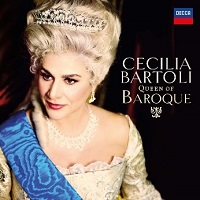 Queen of Baroque
Queen of Baroque
Cecilia Bartoli (mezzo)
rec. Various dates and locations – see below.
Reviewed as streamed in 24/48 sound
Texts and translations included
DECCA 4851275
[78:31] CD from
Amazon UK
or
Presto
I’m simultaneously delighted and annoyed by this release: delighted,
because I’m a great fan of Cecilia Bartoli and only too pleased to have
another chance to hear some of her best recordings; annoyed because only
two items here are new to the catalogue and, in order to obtain them, you
may well be duplicating recordings which you already have. My heart wants
to give the recital a Recommended accolade; my head forbids it.
Two new items, by Steffani and Vinci, open the programme, both world
premiere recordings, though actually set down in 2012 and 2009
respectively. I’m surprised that these have not been included in earlier
Bartoli albums: there’s nothing second-rate about the music, and the
singing is all that you would expect. To obtain these two pieces – six
minutes in all – means purchasing a whole full-price CD or download. Choose
to download them separately in lossless sound, and you’re well on the way
to paying as much as for the whole recital. Decca probably reckon that
Bartoli’s many fans will fork out their hard-earned cash for a
premium-price recording; they are probably right.
Though released in November 2020, I didn’t light on this recording until I
had reviewed an Alpha Classics recording of Handel arias for mezzo (Royal Handel –
review). Despite a small reservation that a complete album of mezzo arias might
be too much for one session, I thought that recording by Eva Zaïcik and Le
Consort one of a select few Handel recitals worth mentioning in the same
review as Hyperion’s Handel Rival Queens CD or the 3-CD collection
which contains it. The good news is that if you chose that recording of
music by Handel and his London rivals, nothing there duplicates anything on
the new Bartoli recording.
Bartoli offers a wide variety of composers and styles – sacred and secular
– whereas Zaïcik concentrates on theatre music. To that extent, my
reservations about over an hour of mezzo arias is less applicable to the
Decca recording. Zaïcik concentrates on less well-known music – three world
premiere recordings of music by Ariosti and one by Bononcini – whereas
Bartoli includes several well-known pieces, such as the opening of the
Pergolesi Stabat Mater and Handel’s Lascia ch’io pianga
and Ombra mai fu.
To return to my reservations: having heard the opening of the Pergolesi,
you will surely wish to listen to Bartoli, splendidly assisted by June
Anderson, Sinfonietta de Montréal and Charles Dutoit, in the complete work
(Decca E4362092, with Scarlatti Stabat Mater, download only). If
that’s too ‘upholstered’ as one of my colleagues described it, reviewing a
less recommendable Naxos alternative, there’s always the crystal-clear Emma
Kirkby, James Bowman, AAM and Christopher Hogwood recording at mid-price on
CD or budget price as a lossless download (Decca Virtuoso 4784029, with Salve Regina). Or there’s Rinaldo Alessandrini pulling the gear
stick from ‘Drive’ to ‘Sport’ (Naïve OP30441, also with Scarlatti Stabat Mater). The Alessandrini has been reissued multiple times
with various catalogue numbers, all now download only.
Bartoli is something of a specialist in the Stabat Mater: in
addition to the Pergolesi, there’s the less well-known Steffani, from which
we also have a 4-minute snippet here. Once again, the excerpt is likely to
send you in search of the parent recording from 2013, with other
distinguished soloists, I Barocchisti and Diego Fasolis (Decca 4785336,
with cantatas). I thought that recording a little too theatrical at first,
but soon warmed to it and made it Bargain of the Month –
DL News 2013/13. That was on the basis that someone at Amazon UK had made
a mistake and put
the mp3 download out at a giveaway price. That no longer applies and, in
any case, it meant accepting a transfer at less than the ideal 320kb/s and
without booklet. Such, however, are the vagaries of pricing that Amazon
currently offer the CD for a very reasonable £9.41, whereas the best price
I can find for a lossless download is £11.11 – at least that’s with the
booklet. Back in 1989, Bartoli also recorded the Rossini Stabat Mater with Semyon Bychkov (Philips 4784782, download only)
and again in 1995 with Myung-Whun Chung (DG 4497182).
Once again, there are alternatives for the Steffani, but Bartoli is
something of a Steffani specialist, so there are good reasons for regarding
her recording as a version of choice for a work that rivals the more famous
Pergolesi in intensity, though composed for Lutheran Hannover. There’s also
a 3-CD Steffani Project set (Decca 4785827, CD only, no download),
from which several other tracks on the new release are taken. Göran
Forsling thought Mission, one of the CDs included in that set ‘as
perfect as anything can be’ –
review.
If you fancy a wallow in settings of the Stabat Mater, you can do
so to your heart’s content with a 13¾-hour collection on Brilliant Classics
95370a. That’s download only, and comes without booklet, but can be found
for as little as £9.75 in lossless sound, even better value than when I
referred to the CDs as a bargain at £37. The performances are variable, but
include the Steffani from The Sixteen and Harry Christophers, recorded in
2009 and still available on their own Coro label, with Handel Dixit Dominus (COR16076 CD, or download from
thesixteenshop.com).
There’s a huge difference between the Coro and the Decca teams in the
Steffani Stabat Mater. There’s an old story about several blind
men examining different parts of an elephant and coming up with very
different descriptions of the same animal. The same is true of these two
recordings: the Decca – on which Bartoli actually doesn’t have a huge role
– knocks the listener down with the enormous grief of the Virgin Mary at
the foot of the cross, reminding us that, though composed for Hannover,
this is a work of the Italian baroque.
Christophers and The Sixteen field an equally fine team of soloists:
sopranos Elin Manahan Thomas and Grace Davidson, tenors Jeremy Budd and
Mark Dobell and bass Rob Macdonald. Instead of slapping the listener in the
face, this is a much more thoughtful interpretation, stressing the beauty
of the music rather than the drama. It’s head and heart again; in a head
moment, I would go for the Coro, which I downloaded in lossless flac (link
above), in a heart moment I’d choose the Decca, not least for the other
Steffani works. You may well have a recording of the Coro coupling, the
Handel Dixit Dominus, good as it is, but I suspect that most would
find that the more comfortable recording of the Steffani to live with.
In Steffani’s Serena, o mio bel sole… Mia fiamma… Mio ardore from Niobe, Bartoli is joined by Philippe Jaroussky. I missed the
complete recording of that opera when it was released, with Jaroussky,
Karin Gauvin, Boston Early Music Festival Orchestra, Paul O’Dette and
Stephen Stubbs (Erato 2564634354). It’s one of those many things that I
must catch up with.
I started by half enjoying Queen of Baroque and half annoyed at
being asked to pay out for a CD with only six minutes of new material. As
it turns out, I have started to lean more towards the new release. It
provides a reminder of Bartoli’s style in the music of this period, but
it’s a rather over-the-top style which won’t be to all tastes, so you may
be happy to have these short extracts from her other recordings and turn to
performances of works such as the Pergolesi and Steffani settings of Stabat Mater that are easier to live with in the longer term.
And if you decide not to purchase it, I do recommend at least streaming it
if you can. Naxos Music Library didn’t have it when I checked, but they
have the earlier albums from which the material is taken, in mp3. The
hi-res recording to which I listened as streamed from Qobuz is very good. I
imagine that the earlier tracks have been (very successfully) upgraded from
16-bit originals. The CD is on sale at rather more than the usual
full-price – I couldn’t find it for less than £16 – so the Qobuz asking
price of £16.49 for 24-bit, with pdf booklet (£11.99 for 16-bit), doesn’t seem as
steep as usual. I praised the recording quality of the Alpha Royal Handel album; if anything, the Decca sound is even better
Details:
Agostino STEFFANI (1654–1728)
E l’honor stella tiranna
(I trionfi del fato, Hanover, 1695; Enea)* [2:01]
Leonardo VINCI (1690–1730)
Quanto invidio la sorte … Chi vive amante
(Alessandro nell’Indie, Rome, 1730; Erissena)* [4:00]
George Frideric HANDEL (1685–1759)
Lascia ch’io pianga mia cruda sorte
(Rinaldo, London, 1711; Almirena) [4:50]
Riccardo BROSCHI (c.1698–1756)
Son qual nave ch’agitata
(Artaserse, London, 1734; Arbace) [7:28]
Giovanni Battista PERGOLESI (1710–1736)
Stabat Mater dolorosa
: Stabat mater [3:53]
(with June Anderson soprano)
Antonio VIVALDI (1678–1741)
Agitata da due venti
(Griselda, Venice, 1735, Costanza) [5:22]
Agostino STEFFANI
Serena, o mio bel sole… Mia fiamma… Mio ardore
(Niobe, regina di Tebe, Munich, 1688; Anfione, Niobe) [2:18]
(with Philippe Jaroussky countertenor)
Alessandro SCARLATTI (1660–1725)
Caldo sangue
(Il Sedecia, re di Gerusalemme, Rome or Urbino, 1705; Ismaele) [5:29]
George Frideric HANDEL
Ombra mai fu
(Serse London, 1738; Serse) [3:24]
Tomaso ALBINONI (1671–1750/51)
Aure, andate e baciate
(Il nascimento dell’Aurora, Venice, c.1710; Zefiro) [3:21]
Carl Heinrich GRAUN (c.1703–1759)
Deh, tu bel Dio d’amore … Ov’è il mio bene?
(Adriano in Siria, Berlin, 1746; Farnaspe) [3:41]
Agostino STEFFANI
Stabat mater
: Eja Mater, fons amoris … Fac ut ardeat … Sancta Mater … Tui nati, vulnerati [4:19]
(with Franco Fagioli countertenor & Daniel Behle, Julian Prégardian
tenors
Antonio CALDARA (c.1671–1736)
Vanne pentita a piangere
(Il trionfo dell’Innocenza Santa Eugenia) [8:49]
George Frideric HANDEL
Disserratevi, o porte d’Averno
(Oratorio per la Resurrezione di Nostro Signor Gesù Cristo, Rome, 1708;
Angelo) [4:44]
Nicola PORPORA (1686–1768)
Parto, ti lascio, o cara
(Germanico in Germania, Rome, 1732; Arminio) [10:45]
Agostino STEFFANI
Combatton quest’alma
(I trionfi del fato: Enea, Lavinia) [2:06]
(with Philippe Jaroussky countertenor
George Frideric HANDEL
Bel piacere è godere fido amor
(Rinaldo: Almirena) [2:05]
Cecilia Bartoli (mezzo)
World-Premiere Recording*
Coro della Radiotelevisione Svizzera; I Barocchisti/Diego Fasolis; Il
Giardino Armonico/Giovanni Antonini; Academy of Ancient Music/Christopher
Hogwood; Sinfonietta de Montréal/Charles Dutoit; Sonatori de la Gioiosa
Marca; Les Musiciens du Louvre/Marc Minkowski; Cappella Gabetta/Andrés
Gabetta
Locations: L’Église de Saint-Eustache, Montréal, October 1991; Teatro
Olimpico, Vicenza, Italy, June 1998 (live); Henry Wood Hall, London, 19–27
November 1999; Salle Wagram, Paris, 27–29 August 2004; L’Église du Liban,
Paris, 11–22 February 2005; Centro Cultural Miguel Delibes, Valladolid,
Spain, 28 January–24 March 2009; Auditorio Stelio Molo, Lugano, Italy,
November 2011–March 2012, January–June 2013; Evangelisch-reformierte
Kirchgemeinde Oberstrass, Zurich, 8–14 March 2017
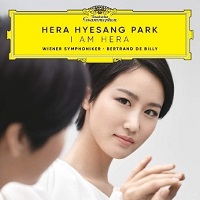 I am Hera
I am Hera
Hera Hyesang Park (soprano)
Johannes Maria Bogner (harpsichord)
Wiener Symphoniker/Bertrand de Billy
rec. 29 June - 4 July 2020, Mozart-Saal, Konzerthaus, Vienna. DDD.
Texts and translations included.
Reviewed as downloaded from press preview. No booklet with download.
DEUTSCHE GRAMMOPHON 4839456
[69:14] CD from
Amazon UK
or
Presto
Here’s the perfect foil to the Cecilia Bartoli: an excellent young soprano
making her debut recital recording for DG, with some familiar and some less
obvious repertoire. I have reviewed this in detail for the main reviews
page, so I’ll simply report here my appreciation of the singing, accompaniment
and recording and my annoyance that the commercial download appears to come
without booklet.
Christoph Willibald GLUCK (1714-1787)
Orfeo ed Euridice, Wq30: Qual vita è questa mai [1:38]
Che fiero momento
[3:15]
Giovanni Battista PERGOLESI
La Serva Padrona: Stizzoso, mio stizzoso
[3:36]
George Frideric HANDEL (1685-1759)
Giulio Cesare in Egitto: Se pietà di me non senti
[9:16]
Wolfgang Amadeus MOZART (1756-1791)
Le nozze di Figaro, K492: Giunse alfin il momento [1:09]
Deh vieni, non tardar
[2:54]
Gioachino ROSSINI (1792-1868)
Il barbiere di Siviglia: Una voce poco fa
[6:09]
Wolfgang Amadeus MOZART
Idomeneo, K366: Quando avran fine omai [3:29]
Padre, germani, addio!
[3:21]
Don Giovanni, K527: Vedrai, carino [3:19]
Die Zauberflöte, K620: Ach, ich fühl’s, es ist verschwunden [3:25]
Gioachino ROSSINI
Il Turco in Italia: Non si dà follia maggiore
[3:31]
Vincenzo BELLINI (1801-1835)
I Capuleti e I Montecchi: Eccomi in lieta vesta
[4:55]
Oh! quante volte ti chiedo
[3:44]
Giacomo PUCCINI (1858-1924)
La bohème, SC67: Quando m’en vo soletta [2:29]
Gianni Schicchi, SC88: O mio babbino caro [2:14]
Joowon KIM (b.1984)
Like the Wind That Met with Lotus [5:27]
Un-Yung LA (1922-1993)
Psalm 23 (arr. Bernhard Eder) [5:13]
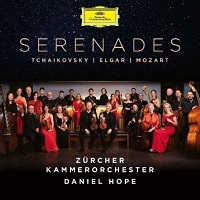 Serenades
Serenades
Pyotr Ilyich TCHAIKOVSKY (1840-1893)
Serenade for strings in C, Op.48 [30:17]
Sir Edward ELGAR (1857-1934)
Serenade for Strings in e minor, Op.20 [12:15]
Wolfgang Amadeus MOZART (1756-1791)
Serenade No.13 in G, K525 ‚Eine kleine Nachtmusik‘ [20:31]
Zürcher Kammerorchester/Daniel Hope
rec. ZKO-Haus, Zurich, September 2020. DDD.
Reviewed as downloaded from press preview. Booklet included with download.
DEUTSCHE GRAMMOPHON 4839845
[63:09] CD from
Amazon UK
or
Presto
If you thought that a serenade was just a piece of inconsequential late-night entertainment,
you must have forgotten the Tchaikovsky. Lightness there is, most notably
in the second movement waltz, but right from the opening movement, there
are shadows cast by the light. As Tchaikovsky wrote to his benefactor,
Madame von Meck, “it is a heartfelt piece”. No conductor has put his or her
heart into music as deeply as Sir John Barbirolli, and it’s with his
recording of this work, with the LSO, at the back of my mind that I
approach any new recording. It’s no longer available, except for the Waltz
on a Warner Red Line album entitled ‘Relaxation’, and that’s the least
memorable part of his recording, which also offered the Arensky Tchaikovsky
Variations (HMV ASD646).
It’s Barbirolli in Elgar, too, and this time his recording with the
Sinfonia of London remains available, albeit as a download only (English Music for Strings, Warner Great Recordings 5672402, or
better value, with more generous coupling, on Warner Masters 0851872). It’s
not just long familiarity with the Barbirolli Elgar that makes it feel so
right; the coupling is equally revelatory – the Elgar Introduction and Allegro, Elegy and Sospiri, and
Vaughan Williams Tallis and Greensleeves Fantasias, plus
a Delius Brigg Fair to rival Beecham on the longer album.
At this stage, then, I’m left undecided. Daniel Hope and the Zurich Chamber
Orchestra capture the light and shade of the Tchaikovsky in a performance
as good as any that I have heard recently. It comes, for example, with the
‘richer denser texture’ that Gwyn Parry-Jones found wanting in the LSO Live
recording –
review
– and it matches the intensity which I found on the Orchid Classics
recording from the Russian Virtuosi of Europe –
review
–
DL News 2016/5.
The Elgar, too, captures the spirit of the music very well, and it comes
in better sound than the Barbirolli, good as that is for its age (rec.
1962).
A light-footed Eine Kleine Nachtmusik rounds off a very enjoyable
recording. If the coupling appeals, this is an attractive release. If you
must have CD or hi-res sound, the Barbirolli Elgar lacks both of those,
clearing the way for Daniel Hope, the Zurich Chamber Orchestra and the DG
engineers to entertain you. Like most DG downloads, it comes with a pdf
booklet, making it all the more surprising that their stable mate Decca’s
don’t.
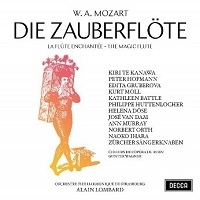 Wolfgang Amadeus MOZART (1756-1791)
Wolfgang Amadeus MOZART (1756-1791)
Die Zauberflöte
(The Magic Flute), K620 [2:31:54]
Kiri Te Kanawa (soprano, Pamina)
Peter Hofmann (tenor, Tamino)
Edita Gruberova (soprano - Königin der Nacht)
Kurt Moll (bass, Sarastro)
Kathleen Battle (soprano, Papagena)
Philippe Huttenlocher (Papageno)
Norbert Orth (tenor, Monostatos)
Helena Döse (soprano), Ann Murray (mezzo), Naoko Ihara (contralto) (Damen)
José van Dam (baritone, Speaker)
Zürcher Sängerknaben
Chœurs de l’Opera du Rhin
Orchestre Philharmonique de Strasbourg/Alain Lombard
rec. 7 June 1978, Palais de la Musique et des Congres, Strasbourg. DDD.
Reviewed as downloaded from press preview – no booklet
DECCA 4855200
[74:11 + 78:05] CD from
Amazon UK
As with the Josquin (above), there’s more that I want to say about this
recording than I have time for here, but one of my colleagues has submitted
more detailed thoughts: look out for forthcoming review from Mike Parr – ‘A
starry line-up of singers does not disappoint in a polished account of
Mozart’s last opera in a long absent recording that receives its first
digital release’.
Recorded in 1978, and first released on the independent Barclay label, it’s
making its first CD appearance now. Don’t go for this if you don’t like the
spoken dialogue. Klemperer’s recording (Warner) is still my top choice for
recordings without it, but there’s an alternative (download only) version
of this Decca recording: at 90 minutes, it’s not quite as complete as the
Klemperer, but it has almost all the sung content (4877754).
Lombard strikes a good balance between the lighter and more serious aspects
of the opera, and the cast contains some of the finest singers of the time.
Anything with Kiri te Kanawa is OK by me; there are no real shortcomings in
any of the parts, and the recording wears its years well. Overall, this is
a non-controversial if slightly undramatic account. The lack of a booklet
with either of the download versions is something of a no-no, however.
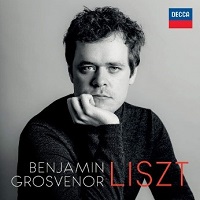

Franz (Ferenc) LISZT (1811–1886)
Piano Sonata in b minor, S178 [31:52]
Berceuse, S174ii [9:43]
Années de pèlerinage, Deuxième année: Italie, S161:
IV. Sonetto 47 del Petrarca (“Benedetto sia ’l giorno”) [6:07]
V. Sonetto 104 del Petrarca (“Pace non trovo”) [7:02]
VI. Sonetto 123 del Petrarca (“I’ vidi in terra angelici costumi”)
[7:28]
Réminiscences de Norma: Grand fantaisie, after the opera by Vincenzo Bellini, S394 [16:33]
Lieder von Franz Schubert, S558: XII. Ave Maria, after Ellens dritter Gesang, D839
[5:35]
Benjamin Grosvenor (piano)
rec. 19–22 October 2020, Queen Elizabeth Hall, South Bank Centre, London.
DDD.
Reviewed from press preview. No booklet with commercial download.
DECCA 4851450
[84:29] CD from
Amazon UK
or
Presto
We may not have been in urgent need of another recording of the Liszt Piano
Sonata, with classic recordings a-plenty, among which I have chosen Martha
Argerich’s (1960) stunning debut recording (DG Originals 4474302, with
Hungarian Rhapsody No.6, Chopin, Brahms, Prokofiev and Ravel –
review
of earlier reissue, differently coupled). The sonata was not included on
the original release, SLPM138672, but was recorded later, in 1971, and
released on 2530193; it’s added here as a marvellous encore. In the
intervening years, one might have expected the fiery temperament to have
cooled; it hadn’t, and still hasn’t.
Conventional wisdom would suggest that pianists are good either at Chopin
or Liszt, not both, so the success of Benjamin Grosvenor’s Chopin Piano
Concertos last year, hailed by Michael Greenhalgh as ‘consistently
satisfying [and played with] authority’ –
review
– and his earlier Chopin recordings, should put him out of the running for
Liszt. If so, nobody told him – or Martha Argerich, for that matter. On the
contrary, the very qualities singled out by MG from his Chopin – ‘fluent,
assured, charismatic, ebullient, fiery as appropriate’ – stand him in very
good stead in Liszt.
You need only look at comparative timings for the opening movement –
subdivided across four tracks for Argerich, totalling 10:46 – to see that
Grosvenor’s (at 12:30) is an altogether more reflective proposition. That
will probably be a little too reflective for some, and they should stick
with Argerich, but there’s a definite place for both. Grosvenor proved
early in his career that he has technique in abundance, and that’s
a pre-requisite for the Liszt sonata, but Grosvenor reminds us, too, of Liszt
the arch-romantic, showman and dreamer of beautiful dreams, hard-hitting
yet meditative.
With the rest of the very generous programme equally attractive, this is a
Liszt recital to cherish.
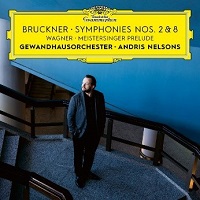 Richard WAGNER (1813-1883)
Richard WAGNER (1813-1883)
Die Meistersinger von Nürnberg
: Overture [10:28]
Anton BRUCKNER (1824-1896)
Symphony No.2 in c minor (2nd version 1877, ed. William Carragan) [58:10]
Symphony No.8 in c minor (version 1890, ed. Leopold Nowak) [81:57]
Gewandhausorchester Leipzig/Andris Nelsons
rec. live Gewandhaus zu Leipzig, 3–8 December 2019 (Meistersinger
Prelude & Symphony No. 2) & 4–6 September 2019 (Symphony No. 8).
DDD.
Reviewed as downloaded from press preview
DEUTSCHE GRAMMOPHON 4839834
[2:30:42] CD from
Amazon UK
or
Presto
or
ArkivMusic
Deep joy, as Stanley Unwin used to say, that the overture comes first on
CD1. At last, the record companies may be seeing sense; who wants to hear
the filler after the major work? The words ‘overture’ and ‘prelude’ carry
the clue. And what a good idea to preface a 2-CD set of Bruckner with music
from the man that he idolised, Wagner. A truly awful person, just the
opposite of Bruckner himself, yet I share his enthusiasm for the music. I
just told a new reviewer whom we are welcoming on board that my enthusiasm
for opera is limited to Mozart, Monteverdi and Wagner – a huge
over-generalisation, but those are my main anchors. And what a delight that
all that epic Wagner is leavened by Die Meistersinger, as Verdi’s
serious operas were by Falstaff. It is possible to imagine a
livelier account of the overture, but it makes a good start.
Bruckner’s early symphonies need all the help they can get from the
conductor and orchestra, even to the extent of pulling the music about to
make the point – something I normally dislike, but I make an exception for
Eugen Jochum’s Bruckner (Symphonies Nos. 1-9: DG E4698102, or Warner
9029531746). Andris Nelsons leaves the music too much ‘as is’, and it
failed to make an impression on me. Could the detractors who think Bruckner
boring actually be right? Jochum suggests otherwise, as does Georg Tintner
on Naxos –
review.
Symphony No.8 is complete on CD2, taking a smidgin over the putative 80
minutes limit. That’s becoming more common; 81:57 is by no means the
longest – no problem for the download or the streamed version, but it may
place a few older CD players under strain. I believe the standard advice if
that’s a problem is to start the final track separately. It certainly adds
to the attraction of this new set, when No.8 sometimes runs to two CDs,
as DG’s own Karajan recording used to, though the DG Originals reissue is
now complete on one mid-price disc (4790528).
Nelsons’ Eighth is much more the real thing than his No.2. I won’t go into
detail because Dan Morgan has said it so well in his forthcoming review. Go
for Günter Wand instead: with the NDR Symphony (RCA G0100002805890) or the
Berlin Philharmonic (RCA 88691922952, Nos. 4, 5, 7, 8 and 9), both download
only, or the complete Jochum set listed above.
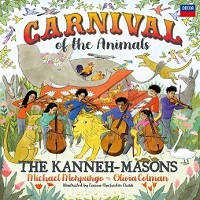 Carnival
Carnival
Camille SAINT-SAËNS (1835-1921)
Le Carnaval des Animaux
(with verses by Michael Morpurgo)
Michael MORPURGO (b.1943)
Grandpa Christmas
(including music by
Béla Bartók, Mario Castelnuovo-Tedesco, Edvard Grieg, Bob Marley,
Nikolay Rimsky Korsakov, Piotr Ilyich Tchaikovsky
and Eric Whitacre)
Michael Morpurgo, Olivia Colman (narrators)
The Kanneh-Masons
rec. August 2020, Abbey Road Studio 2, London. DDD.
Reviewed as streamed in lossless sound – no booklet.
DECCA 4851156
[63:43] CD from
Amazon UK
or
Presto
Children might well fall in love with this recording from the colourful
cover alone, and, while grown-ups may prefer a recording without the
narration, I can’t think of anyone better suited to making the music
available to the very all ages than children’s author Michael Morpurgo.
That the recording could be made, in the midst of a pandemic which Michael
Morpurgo is on record as finding an ordeal, is something of a miracle. In
the event, the reduced forces required by social distancing proved a
blessing in disguise. The members of this incredibly talented family are
augmented by a few friends, and the verses are not too twee for adult
listening. In any case, if downloaded, these can be edited out – but save a
copy of the original, too. Alternatively, there’s a very fine small-scale
narration-free recording from Renaud Capuçon and friends on Erato 5456032,
with more music by Saint-Saëns –
September 2009.
(Ignore the defunct passionato link.)
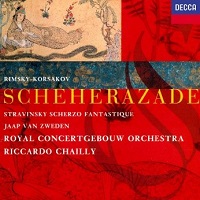 Nikolai RIMSKY-KORSAKOV (1844-1908)
Nikolai RIMSKY-KORSAKOV (1844-1908)
Scheherazade
– symphonic suite, Op.35 [46:41]
Igor STRAVINSKY (1882-1971)
Scherzo fantastique, Op.3 [12:02]
Jaap van Zweden (violin)
Royal Concertgebouw Orchestra/Riccardo Chailly
rec. December 1993 & April 1994, Concertgebouw, Amsterdam
Presto CD and download (no booklet with download)
Reviewed as lossless download
DECCA 4437032
[58:43] For purchase details see
review by John Quinn.
Large amounts of back catalogue are now available only as part of a monster
box set or as downloads. Many such recordings are still very worthwhile –
this is a case in point – but not everyone wants another huge box of CDs,
but not everyone is yet comfortable with streaming and downloading. Many
are suspicious about the quality when, until recently, the only game in
town was mp3, usually purveyed at less than the maximum possible bit-rate.
Now, 16-bit lossless sound, equivalent to CD quality is rapidly becoming
the norm, with better quality 24-bit, equivalent to SACD, increasingly
available for recent recordings.
I very much enjoyed hearing this Scheherazade as streamed in
lossless sound, but many listeners still want something physical, which is
where Presto come in, offering special CDRs, made under licence, with all
the original materials, including the booklet – the latter often not
included with the download or streamed version, as in this case. Others,
such as Hyperion and Chandos, offer deleted back catalogue as CDRs from
their archives, but the advantage is less in that case because they include
a pdf booklet with the download equivalent.
Like John Quinn (link above), I have several classic recordings in mind; in
my case as well as the Beecham and Reiner recordings which he mentions, I
still turn to Pierre Monteux in his heyday with the LSO (1957), most
recently released by Eloquence (4808889, with Russian Easter Festival Overture, LPO/Boult) but, like the
Beecham, the recording, very decent for its age, is no match for the
Chailly. Of similar vintage to the Beecham and Monteux, I liked the Beulah
(download only) reissue of Ansermet’s recording –
DL News 2015/7.
I gave an iTunes link, but that recording is now available in superior
16-bit lossless sound from
Qobuz,
for the same price, £7.99.

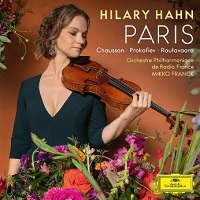 Ernest CHAUSSON (1855-1899)
Ernest CHAUSSON (1855-1899)
Poème
for violin and orchestra, Op.25 (1896) [16:55]
Sergei PROKOFIEV (1891-1953)
Violin Concerto No.1 in D, Op.19 (1923) [21:27]
Eonojuhani RAUTAVAARA (1928-2016)
Serenade No.1 ‘pour mon amour’ (2016) [7:50]
Serenade No.2 ‘pour la vie’ (2016) [6:37]
Hilary Hahn (violin)
Orchestre Philharmonique de Radio France/Mikko Franck
rec. 17 February 2019 (Rautavaara), 19 June 2019, Grand Hall, Maison de la
Radio, Paris. DDD.
Reviewed as downloaded from press preview
DEUTSCHE GRAMMOPHON 4839847
[53:05] Also on two vinyl LPs: 4839848 CD and LPs from
Amazon UK
or
Presto
Like the recording of the complete Ives symphonies (below), this release is
virtually self-recommending. My only reservation is that there would have
been room for Prokofiev’s second violin concerto. I know that wouldn’t fit
the ‘Paris’ theme – the first concerto was composed and premiered there in 1923 –
but it would have made the recording more competitive with two other very
fine recordings of both concertos, coincidentally also with a female soloist and
from the Universal stable: Lisa Batiashvili with the COE and Yannick Nézet
Séguin (DG 4798529 –
review)
and Kyung-Wha Chung with the LSO and André Previn – even better value
with the two Prokofiev concertos and the Stravinsky (Decca 4767226, Presto
special CDR, or 4250032, download only).
The new release, however, also includes unique added value in the form of
the two Rautavaara pieces which close the programme, composed at the end of
his life for these very performers, who gave the world premiere in the same
month as the recording was made, February 2019. This is a very different
Rautavaara from his best-known work, Cantus Arcticus; softer in
mood, these two pieces are ideally suited to Hahn, Mikko Franck and the
Radio France orchestra.
Though the booklet is, almost inevitably these days, focused on Hilary
Hahn’s star appeal, it does manage to convey valuable information about the music. I
do hope that it will be available with the commercial download.
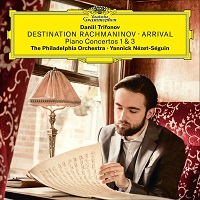 Sergei RACHMANINOV (1873-1943)
Sergei RACHMANINOV (1873-1943)
Destination
Rachmaninov
-
Arrival
The Silver Sleigh Bells Op.35, 1st movement (1913, transcribed
Trifonov) [6:56]
Piano Concerto No.1 in f-sharp minor Op. 1 (1891/1917) [28:15]
Vocalise
Op.34 No.15 (1915, transcribed Trifonov) [3:34]
Piano Concerto No.3 in d minor Op. 30 (1909) [43:01]
Daniil Trifonov (piano)
Philadelphia Orchestra/Yannick Nézet-Séguin
rec. November 2016 (No.1) April 2018 (No.3, live) Verizon Hall, Kimmel
Center, Philadelphia. February 2019 Berlin Philharmonie (Op. 35, live)
January 2018 Richardson Auditorium, Alexander Hall, Princeton University
(Op. 34, live)
Reviewed as downloaded from press preview. Also available on vinyl LP.
DEUTSCHE
GRAMMOPHON
4836617
[81:46] For availability see
review.
We missed this second volume of ‘Destination Rachmaninov’, having lavished
collective praise on its predecessor. I’m pleased that Universal were able
to supply us with the digital files and that one of our very welcome new
reviewers has reviewed this for us. In summary, David McDade thought that
‘The first concerto glows, but aspects of the third take this out of
contention’ – full
review.
I enjoyed both concertos, and I’m less critical of Trifonov’s No.3, but
it is the least special of the four concertos recorded over the two CDs.
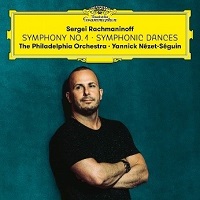 Sergei RACHMANINOV (1873–1943)
Sergei RACHMANINOV (1873–1943)
Symphony No.1 in d minor, Op.13 (1897) [45:15]
Symphonic Dances, Op.45 (1940) [35:37]
The Philadelphia Orchestra/Yannick Nézet-Séguin
rec. Kimmel Center for the Performing Arts, Verizon Hall, Philadelphia,
September 2018 (Symphonic Dances), June 2019 (Symphony No. 1).
Reviewed as downloaded from press preview.
DEUTSCHE GRAMMOPHON 4839839
[80:49] For availability see
review: this new DG release is the most auspicious augur for more
Rachmaninov from an orchestra that can once again be referred to as
“Those Fabulous Philadelphians”. (Ian Julier, another very welcome recruit to the team of
download reviewers).
This new release takes us from the depths of despair after the failure of
his First Symphony to one of Rachmaninov’s last works. The coupling is
appropriate because of the quotation from the symphony in the Symphonic
Dances and the passing reference to the Dies Iræ theme in both.
The composer may not have had the motto ‘My end is my beginning’ in mind,
but it certainly applies.
The Philadelphia Orchestra and Yannick Nézet-Séguin have already filled in
some of the interim with two DG recordings with Daniil Trifonov covering
the four piano concertos (Departure: Nos. 2 and 4, 4835335: Recording of
the Month –
review
–
review
–
2018/2;
Arrival: Nos. 1 and 3, 4836617 - see above). An earlier recording brought us the same
team in the Paganini, Corelli and Chopin Variations (4794970 –
review). Now they turn their attention to the symphonies – all of them in due
course, I hope.
Symphony No.1 was an orphan for many years – if it caused the composer’s
breakdown, could it be any good? As it turns out, the fault lay not in the
music but in the disastrous decision to entrust the first performance to
Glazunov, drunk and incapable in front of an ill-prepared orchestra. After
treatment by an analyst, Rachmaninov took up his pen again and composed
what turned out to be one of his greatest hits, the Second Piano Concerto,
dedicated to the analyst. It was only after his death that the symphony was
rediscovered.
For many years I accepted the line adopted in programme notes for the
concerto, that the symphony was not worth reviving. What opened my ears was
a CBS recording from the Philadelphia Orchestra and Eugene Ormandy, still
available with the other two symphonies and Vocalise on Sony RCA
(G010002945243S, download-only, around £12.50 in lossless sound, no booklet
–
review
of earlier 2-CD release). The association of the Philadelphia and Ormandy
with Rachmaninov goes back even further: the composer’s own recordings were
made with them (now on Naxos Historical). It’s almost written in the stars
that their modern equivalents have the music in their blood. The Third
Symphony and the Symphonic Dances were composed with this orchestra, in its
Ormandy heyday, in mind, though the First was premiered in Moscow in 1945.
Since the Ormandy recording, the success of which was boosted by its use as
the theme tune for a BBC TV current affairs programme, we have had numerous
fine recordings; one of my favourites, from Andrew Litton and the RPO
(1989), also survives as a download with the other two symphonies (Erato de
Virgin 5620372, around £11). The Andrew Previn recording with the LSO is
also still available, but, at over £38 for the three symphonies, Isle of the Dead, Vocalise, Aleko and Symphonic
Dances, vastly over-priced (Warner 7645302). (Previn’s Nos. 2 and 3 remain
available separately – shop around to download them for around £8.50 each.)
What looks on the face of it an attractive bargain, from Valery Gergiev
with the LSO on their own label, left me disappointed –
review.
Its reissue in a pack of all three symphonies makes it no more
attractive. Dan Morgan thought Vladimir Ashkenazy’s live recording on
Signum ‘worth a shot’ –
review
– but Nick Barnard thought its release a mistake –
review.
Because of its easy and inexpensive availability, it’s the Litton which I
have chosen for comparison. Litton is a natural Rachmaninov interpreter –
witness his recordings of the piano concertos with Stephen Hough in Dallas (Hyperion) –
and his recording has consistently been regarded as one of the best, though
it can’t disguise the rather episodic nature of the music, and it’s well
recorded (16-bit and CD only; no SACD or 24-bit). The original single-CD
release which I own starts off on a very good foot by placing the filler –
a powerful performance of Isle of the Dead – first. There’s a
stronger case than usual for DG to regard the symphony and the Symphonic
Dances as co-equal, but I would still have preferred the Dances first.
There are no great disagreements between Litton and Nézet-Séguin over
tempo: the former is a shade slower in three of the movements – seconds
only in movements ii and iv – and a little faster in the larghetto
third movement. Both bring due power to the music in the outer movements,
but Nézet-Séguin holds the music together a little more coherently. He may
make it sound a fraction less exciting at the climaxes, but gains by making
the whole seem less episodic.
In the larghetto, where Litton takes 9:42, Nézet-Séguin lingers
just a few seconds longer, but the effect is hardly noticeable in practice.
Ashkenazy (Decca 4557982, 3 CDs, budget price) really takes this movement
at a fast pace, shaving very nearly a minute off even Litton’s time, and
Pletnev, on another DG recording is almost as fast. Having been nurtured on
the Ormandy recording (8:45), I have never thought a fastish tempo
inappropriate for the movement.
Certainly Litton, Previn (9:59) and Nézet-Séguin can’t be accused of
skating over the surface, but are they squeezing the last drops of ‘Mother
Russia’ out of the music here? If so, I like the result, though without
rejecting the faster-paced Ormandy and Ashkenazy versions.
For the Symphonic Dances, another work to which I was introduced by Ormandy
and the Philadelphia Orchestra, now with Smetana and Offenbach on a Sony
download (G010001222653E), my benchmark is again Litton, this time with the
Bergen Philharmonic (BIS-1751 SACD, with Isle of the Dead and The Rock), reviewed as a 24/44.1 download with pdf booklet from
eclassical.com. John Quinn thought that superb –
review
– and I’m very happy to agree –
2012/23.
That comes with another appropriate coupling – the Dies Iræ
theme, touched on in the Dances, more prominently treated in Isle of the Dead. Among older recordings, the Beulah reissue of
Kiril Kondrashin’s recording with the Moscow PO, coupled with Symphony No.3
(Moscow RSO/Svetlanov) would be well worth streaming or downloading from
Qobuz in a good transfer (1PD81), except that, as currently presented, one
of the tracks cuts out short. (I’ve reported it.)
Though the Litton Erato recording is CD or 16-bit only, it still sounds
very well, but the new DG, though available for streaming only in 16-bit as
I write, is better still, well up to the quality that their engineers
established with their earlier Rachmaninov recordings in Philadelphia.
Presto are offering a 24/96 download.
All in all, then, though I’m not about to throw out the Ormandy 2-CD set
(if I can find it), the modern equivalent of his orchestra has given us
some very fine Rachmaninov.

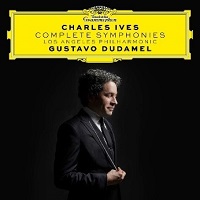 Charles IVES (1874-1954)
Charles IVES (1874-1954)
Complete Symphonies
Symphony No.1 (1895-1898) [36:24]
Symphony No.2 (1900-1902) [35:49]
Symphony No.3 ‘The Camp Meeting’ (1904) [21:21]
Symphony No.4 (1912-1925) [30:53]
Los Angeles Master Chorale
Los Angeles Philharmonic Orchestra/Gustavo Dudamel (with Marta Gardolińska
in No 4)
rec. live, February 2020, Walt Disney Concert Hall, Los Angeles, USA
Reviewed as streamed in 24/96 sound. No booklet
DEUTSCHE GRAMMOPHON 4839505
[2 CDs: 124:00] CD from
Amazon UK
or
Presto
or
ArkivMusic
This recording is self-selecting: Dan Morgan gave it a Recommended tag
-
review - and it’s been chosen as one of the
MusicWeb Recordings of the Month for February 2021, so it needs little
extra comment from me, except to say that if you have the recordings of
these works made by Michael Tilson Thomas, don’t throw them out. The Sony
4-CD set with the Chicago Symphony Orchestra offers top value at around £15, and
also includes the ‘Holidays’ Symphony and other works, including some of
the music which inspired Ives (19439788332). But why does the lossless
download cost over £32 and come without booklet? The later Tilson Thomas
recordings with the San Francisco SO, on their own label, are available on
separate albums, including the ‘Holidays’ Symphony, coupled with the
complete Copland Appalachian Spring (not just the suite) on
SFS0034. (See my
review
of the performance and analysis: Keeping Score DVD on SFS0024; NB:
change of catalogue number).
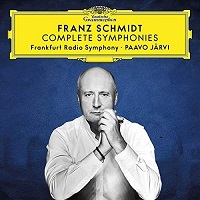 Franz SCHMIDT (1874-1939)
Franz SCHMIDT (1874-1939)
Complete Symphonies
Symphony No.1 in E (1896-1899) [44:20]
Symphony No.2 in E flat (1911-1912) [50:18]
Symphony No.3 in A (1927-1928) [40:26]
Symphony No.4 in C (1932-1933) [44:34]
Notre Dame
: Intermezzo (1903) [4:40]
Frankfurt Radio Symphony/Paavo Järvi
rec. live, March 2013 (2), March 2017 (1), hr-Sedensaal, Frankfurt;
February 2014 (3), April 2018 (4 & Intermezzo), Alte Oper, Frankfurt.
Reviewed as streamed in 24/48 sound. Pdf booklet included.
DEUTSCHE GRAMMOPHON 4838336
[3 CDs: 180:43] CD availability – see
review.
In a game of family musical chairs, Paavo Järvi in Frankfurt on these new
DG recordings is competing with Neeme Järvi in Detroit on Chandos, a 4-CD
set of the complete Schmidt symphonies (CHAN9568, mid-price –
review). Some dealers are asking £37.50 for the Chandos CDs and £38.35 for the
lossless download, but the CDs can be bought direct from
chandos.net
for £31.50, and you should be able to find the lossless download for around
£15. Even so, the new DG offers better value on disc, with the CDs around
£22 and lossless download around £19.
I’ve known and enjoyed the Chandos recordings for a long time, and I have
had only a brief chance to dip into the DG, but what I hear encourages me
to agree with my colleagues who have (mostly, not all) given this set a warm welcome
–
review
–
review
–
review.
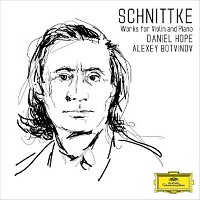 Alfred SCHNITTKE (1934-1998)
Alfred SCHNITTKE (1934-1998)
Suite in the Old Style (1977) [15:06]
Polka after The Overcoat (Gogol Suite) [1:47]
Tango (from Agony) arr. Andriy Rakhmanin [3:01]
Sonata No.1 for violin and piano [17:54]
Madrigal in memoriam Oleg Kagan for violin solo [9:13]
Gratulationsrondo
[7:24]
Stille Nacht
for violin and piano [4:47]
Daniel Hope (violin), Alexey Botvinov (piano)
rec. October and November 2019, Beethovenhaus, Bonn. DDD.
Reviewed as downloaded from press preview
DEUTSCHE GRAMMOPHON 4839234
[59:03] CD from
Amazon UK
or
Presto
or
ArkivMusic
I didn’t think that I liked Schnittke’s music, but the (atypical) opening Suite in the Old Style bowled me over. Though not specifically
adapted from pieces by earlier composers like the Respighi Ancient Airs
and Dances, it’s more in the
manner of Prokofiev’s Classical Symphony. I may have become a little inured
to the charms of the Prokofiev after hearing it so often, so this Schnittke
piece makes an excellent, less familiar, substitute. It’s played here with
clear affection for the music by Daniel Hope and Alexey Botvinov. Hope’s
attachment to Schnittke is apparent throughout the album, even without the
note explaining his ‘love affair’ with the composer’s music and his
subsequent friendship with him.
The Polka and Congratulatory Rondo are also in a very
approachable style, and, though most of the rest of the programme is more
angular in manner, not least the Sonata, these performers make the
strongest possible case for it, even appealing to a stick-in-the-mud like
me. I’ve been impressed by Daniel Hope in the past, but his two very
different recordings this month, the Serenades and the Schnittke, have done
even more to confirm that impression. Go easy on the final assault on Stille Nacht; heard last thing, it might give you a far from
silent night.
I could wish that the booklet – provided with the download, I’m pleased to
note – had been more informative about the music, interesting as Hope’s
account of his meetings with Schnittke is. This is one area where labels
like Hyperion really score, with scholarly but readable, often very
detailed, notes on the music.
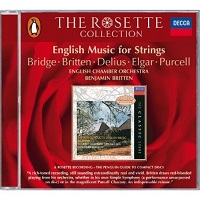 English Music for Strings
English Music for Strings
Henry PURCELL (1659-1695)
Ciacona in g minor, Z.730 (arr. Britten) [6:59]
Sir Edward ELGAR (1857-1934)
Introduction and Allegro for strings, Op.47 (1905)1 [14:09]
Benjamin BRITTEN (1913-1976)
Prelude & Fugue for 18 strings, Op.29 [9:12]
Simple Symphony, Op.4 [17:16]
Frederick DELIUS (1862-1934)
(orch. Eric Fenby)
Two Aquarelles (1917.1932) [5:14]
Frank BRIDGE (1879-1941)
Christmas Dance ‘Sir Roger de Coverley’ [4:27]
Cecil Aronowitz (viola), Emanuel Hurwitz (violin), José Luis Garcia
(violin), Bernard Richards (cello)1
English Chamber Orchestra/Benjamin Britten
rec. May and December 1968, September 1971, Maltings, Snape. ADD
Reviewed as streamed in 16-bit lossless sound.
Presto CD
or download
DECCA 4761641
[57:19]
This is another important back-catalogue recording now available only to
download or stream, or as a special CDR from Presto. Not only does their
special service give the listener something material to hold, with a
booklet to read, at £9.75 it’s more than £2 less expensive than Presto’s
own price for a lossless download, and much less than the £13.49 which
another provider is asking (no booklet with either download). For value,
only one other similar recording springs to mind: Julian Lloyd Webber and
the ECO on Naxos (The Bridge is Love, 8.573250 –
review
–
DL News 2015/3).
Everything here, except the Prelude and Fugue, added from a 1971
recording, was released in 1969 on Decca SXL6405, which I snapped up,
albeit that, as a young teacher, I could seldom afford full-price LPs,
after reading a review by the ever-reliable Trevor Harvey. Incidentally, I
see that the LP cost 43/9, at least £60 in today’s values, a reminder that
the Presto CDR offers more music for comparatively much less. The sound,
too, is a real improvement on the LP, even as played with the best Shure
cartridge that I could afford then. In fact, this can stand
comparison with a modern DDD recording.
The main work, the Elgar Introduction and Allegro, receives a very
emotional performance. If there ever was a conductor who wore his heart on
his sleeve, it was Sir John Barbirolli – see my review of the Tchaikovsky Serenade (above). His recording of English String Music,
containing the Elgar Introduction and Allegro and Serenade for Strings, Elegy and Sospiri, with
Vaughan Williams and Delius, is an essential purchase (Warner 0851872,
download only), but Britten, not normally quite so emotionally up-front,
comes very close indeed to generating the same heart-felt sensation. The
Delius Aquarelles, too, show every sign of Britten’s love for the
music, and his mentor Frank Bridge’s knees-up rounds off an attractive
programme.
One small complaint: this lively recording of the youthful Simple Symphony has also been included
in two other Decca reissues:
with the Young Person’s Guide, Four Sea Interludes, and Frank Bridge Variations on a mid-price Virtuoso CD (4830392) and
on a download-only release with the same programme minus the Four Sea Interludes (E4175092, no booklet).
There is, in fact, a bewildering variety of Britten’s recordings of his own
music for Decca. Another Presto special CDR and download offers another
permutation:
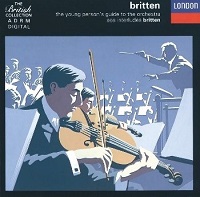 The Young Person’s Guide to the Orchestra, Op.341 [16:34]
The Young Person’s Guide to the Orchestra, Op.341 [16:34]
Peter Grimes
(1945): Four Sea Interludes and Passacaglia, Op.33a2 [23:21]
Soirées musicales
(after Rossini), Op.93 [9:34]
Matinées musicales
(after Rossini), Op.243 [13:15]
London Symphony Orchestra/Benjamin Britten1
Royal Opera House Covent Garden/Benjamin Britten2
National Philharmonic Orchestra/Richard Bonynge3
rec. May 1963, Kingsway Hall, London, ADD1; December 1958,
Walthamstow Assembly Hall, London, ADD2; March 1981, Kingsway
Hall London, DDD3
Presto CD
or download
DECCA 4256592
[62:44]
Of all the reissues of Britten’s own Young Person’s Guide –
without narration – so, properly speaking, Variations on a Theme of Purcell – and the Four Sea Interludes, this best complements the English Music for Strings album; there is no overlap, and it’s
another Presto special CDR, albeit slightly more expensive than its
companion. Composers are not always renowned for the best performances of
their works, but Britten by Britten is very special, not least in this
powerful performance of the Guide.
The excerpts from Peter Grimes are also special, but be warned
that that’s just what they are, with vocal parts included, taken from the
complete recording of the opera which Britten conducted in 1958, with Peter
Pears in the title role and a very strong supporting cast. That remains
available complete on Decca Originals 4757713 (download only, no booklet) or Decca
4830401 (download only, with booklet) or Decca 20C 4787429 (download only,
the least expensive version, but no booklet). The only way now to obtain
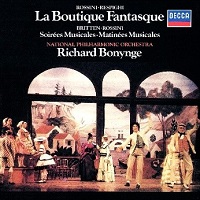 the complete Peter Grimes on CD seems to be Britten: The Complete Operas (Decca 4785448, 20 CDs, currently on
offer from
Amazon UK
for £37.07).
the complete Peter Grimes on CD seems to be Britten: The Complete Operas (Decca 4785448, 20 CDs, currently on
offer from
Amazon UK
for £37.07).
The Rossini-based Matinées and Soirées are taken from a
Richard Bonynge recording from the early digital era, also available in
their original coupling, as on LP (SXDL7539, released in 1982), with
another Rossini pastiche, Respighi’s La Boutique fantasque.
Even on the original LP the sound represented the best of Decca’s early
digital recordings. It has come up sounding very well here, but so has the
rest of this album on another
Presto CD
or download: 4101392. I shall not be disposing, however, of my
Ansermet recording of La Boutique on an older Decca recording –
that remains fine for its age, but the Bonynge comes in better sound
quality.



 All Nimbus reviews
All Nimbus reviews








